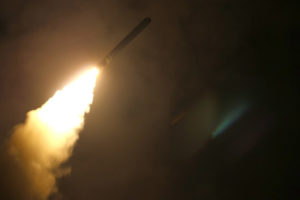by WorldTribune Staff, April 15, 2018
The U.S. strike on Syria’s chemical weapons infrastructure was “well planned, well conducted” and “justified,” a former George W. Bush administration defense official said.

“There were apparently no casualties and no mistaken hits on Russian forces, and the raid seems to have been a textbook example of a surgical strike,” James S. Robbins wrote in an op-ed for USA Today on April 14. “The justified and proportionate action had broad international support and bipartisan political backing inside the United States.”
However other analysts were skeptical. “The damage assessment is suspiciously quick.” said Anthony Cordesman, a former Pentagon official who is an analyst at the Center for Strategic and International Studies, a Washington think tank.
The strike came in for criticism on Fox News by hosts Laura Ingraham and Tucker Carlson, and guest analyst Retired Col. Douglas MacGregor questioned the intelligence justifying the attack saying that in his experience such intelligence is often “politicized”. Former Trump official Sebastian Gorka loudly and heatedly disputed MacGregor’s charge Friday night.
While the Trump strike was won bipartisan praise from the generally bipartisan anti-Trump Washington consensus, liberal MSNBC host Rachel Maddow addressed the fact that the strike was launched only hours after the FBI raided the files of the president’s personal attorney: “The perception that the president may have ordered these strikes in part because of scandal will affect the impact and the effectiveness of these military strikes. Unavoidably. Even if the tail is not wagging the dog.”
The attack, which also involved British and French forces, “was punitive, punishing the Assad regime for conducting illegal and inhuman chemical attacks on civilians,” Robbins wrote. “More important, the raid was intended to have a deterrent effect, to convince Syrian decision-makers that it would be unwise to conduct any future such chemical attacks, in which case they would pay an escalating price.”
Robbins said the April 13 raid also had better results than an attack President Donald Trump ordered after the 2017 Assad regime chemical attack at Khan Sheikhoun.
“The latest raid used more and varied weaponry, involved more counties, and hit more targets than in 2017. Significantly, the targets were higher up the system – not just aimed at the units that conducted the attacks like in 2017, but at chemical weapons stockpiles, a research, development and testing facility, and a command post. Friday night’s raid even touched the center of the highly defended capital Damascus, telegraphing to the Syrians that they have nowhere to hide.”
Trump’s “message to the Assad regime is that if chemical weapons are used again, the response will involve even more weapons and potentially more countries, and hit targets even higher in the system,” Robbins wrote. “These could include senior military command and control nodes and government decision-makers. Ultimately, this chain of escalation leads to Bashar Assad himself. If he continues to use chemical weapons, he will have to wonder how many steps there are between the latest raid and one that could potentially put him in the crosshairs.”
Subscribe to Geostrategy-Direct __________ Support Free Press Foundation
